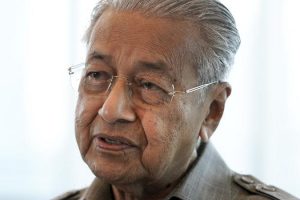As tensions rise with China, Australia is ‘not so safe’, warns Mahathir

Singapore: Australia is needlessly risking its security with a standoff with China, says former Malaysian prime minister Mahathir Mohamad, who claims Canberra must make the first move to settle tensions with Beijing.
In an interview with The Sydney Morning Herald and The Age, Mahathir also attacked the use of the Quadrilateral Security Dialogue – comprising the US, Australia, Japan and India – as a vehicle to try and stand up to China.
Scott Morrison and Mahathir Mohamed meet on the sidelines of an ASEAN summit in Singapore in 2018.Credit:Wallace Woon
He believes it risks provoking Xi Jinping’s regime and that rallying countries together against the Chinese Communist Party is not the way to raise concerns about its behaviour, from its claims to most of the South China Sea to alleged human rights abuses in Xinjiang province.
“It is an aggressive move,” Mahathir said.
“We should have just bilateral relations with countries without any appearance of trying to force our policies on China. Yes, of course, we are unhappy about the treatment of the Uighurs. But for Malaysia, we can’t fight against China. We have to continue to work with them and try to influence them in a small way so that they will treat the Uighurs better.”
Australia’s ties with China remain at an all-time low as Foreign Minister Marise Payne and Defence Minister Peter Dutton embark on a diplomatic tour this week with visits to Jakarta, Seoul, Delhi and Washington DC.
Treasurer Josh Frydenberg is foreshadowing a further rising of tension with China, declaring Australia will not compromise on its “core values” even in the midst of damaging economic coercion.
However, Mahathir, who led Malaysia between 1981 and 2003 and from 2018 to 2020, argues Australia is largely responsible for turning its differences with China into a full-blown diplomatic and trade dispute.
“What is happening now is, of course, people regard Australia almost as an extension of America,” said the 96-year-old. “Your policies are seldom different from America. And America is aggressive because it thinks it is safe. But Australia is not so safe.
“This idea that Australia is part of Europe is still there. You don’t think you are an eastern nation but over time you have to think that you are here. Therefore, what policies you follow must take into consideration your geographical position. But when you just reflect the policies of America sometimes, of course, it will not work because you are not as safe and powerful as America.”
The Australian government has been trying to reopen a dialogue with China for months to no avail, with Beijing still incensed by issues it laid out in a list of 14 grievances it released last November.
They include Australia’s call for an independent probe into the origins of COVID-19, the blocking of Huawei from the 5G network in 2018, Australia’s prominence in an international “crusade” on Taiwan, Hong Kong and Xinjiang and the barring of multiple Chinese investment deals on the grounds of national security.
China was further angered by the cancellation in April of Victoria’s Belt and Road Initiative agreement under the Australian government’s new foreign veto laws.
It has retaliated with continuing sanctions against Australian exports including coal, barley and wine while demanding Australia walk back some of its policies on China.
Mahathir speaks to reporters at Beijing’s Great Hall of the People during a visit as prime minister three years ago.Credit:AP
In 2018, Mahathir himself pushed back against $22 billion in contracts Malaysia had signed with China’s Belt and Road Initiative under predecessor Najib Razak, who has since been found guilty of corruption over the country’s 1MDB sovereign wealth fund scandal.
Warning China could secure influence with debt traps, he renegotiated the terms of the East Coast Rail Link, the signature Belt and Road project in Malaysia, to save a third of the cost but says he did so because it was a bad deal not because it was Chinese.
Mahathir believes Australia needs to loosen restrictions on Chinese investment.
“The country which first made the move should also make the move to reduce that tension,” he said. “And for that, you should remove the restrictions you have on Chinese products. Maybe having Huawei coming in to Australia is too dangerous. But you may think of other things.
“And slowly, I think the Chinese will respond by opening up the imports of Australian products. It may be a gradual process, but I think in the meantime, as you reduce the bans and all that you should also talk to the Chinese about human rights, about things you think they have done wrong.”
China will inevitably be high on the agenda in next week’s Australia-United States Ministerial (AUSMIN) talks between Payne, Dutton and their counterparts in President Joe Biden’s administration.
Australia and the US last week celebrated the 70th anniversary of the ANZUS Treaty, with US Defence Secretary Lloyd Austin saying the Western military power was committed to a “shared vision for a free and open Indo-Pacific” for decades to come.
The mode of the US exit from Afghanistan, however, has raised questions about its dependability as a security guarantor, particularly in a regional landscape in which China is increasingly assertive.
“Americans think of America first,” Mahathir said. “America is forever trying to help people but when the help is extended it’s in the interest of America, not in the interest of the country concerned.”
Get a note direct from our foreign correspondents on what’s making headlines around the world. Sign up for the weekly What in the World newsletter here.
Most Viewed in World
From our partners
Source: Read Full Article


